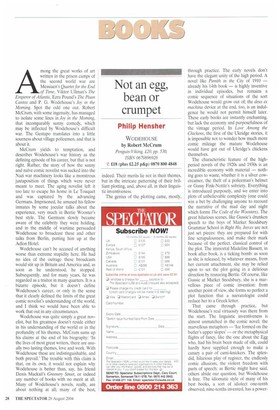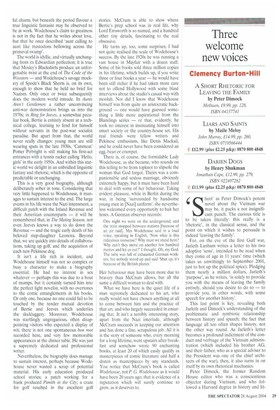Not an egg, bean or crumpet
Philip Hensher
WODEHOUSE by Robert McCrum Penguin/Viking, £20, pp. 530, ISBN 0670896926 £.18 (plus £2.25 p&p) 0870 800 4848 Among the great works of art written in the prison camps of the second world war are Messiaen's Quartet for the End of Time, Viktor Ullman's The Emperor of Atlantis, Ezra Pound's The Pisan Cantos and P. G. Wodehouse's Joy in the Morning. Spot the odd one out. Robert McCrum, with some ingenuity, has managed to isolate some lines in Joy in the Morning, that incomparably sunny comedy, which may be inflected by Wodehouse's difficult war. The Gestapo translates into a little sourness about village policemen, and that is about it.
McCrum yields to temptation, and describes Wodehouse's war history as the defining episode of his career, but that is not right. Rather, the story of how the sunny and naïve comic novelist was sucked into the Nazi war machinery looks like a monstrous juxtaposition of things which were never meant to meet. The aging novelist left it too late to escape his home in Le Touquet and was captured by the advancing Germans. Imprisoned, he amused his fellow inmates by some jocular talks about the experience, very much in Bertie Wooster's best style. The Germans slowly became aware of the celebrity they were holding, and in the middle of wartime persuaded Wodehouse to broadcast these and other talks from Berlin, putting him up at the Adlon Hotel.
Wodehouse can't be accused of anything worse than extreme stupidity here. He had no idea of the outrage these broadcasts would stir up in Britain and America and, as soon as he understood, he stopped. Subsequently, and for many years, he was regarded as a traitor in many quarters. It is a bizarre episode, but it doesn't define Wodehouse's career, or only in the sense that it clearly defined the limits of the great comic novelist's understanding of the world, and I think we would have been able to work that out in any circumstances.
Wodehouse was quite simply a great novelist, but his greatness doesn't reside either in his understanding of the world or in the profundity of his themes. McCrutn sums up his claims at the end of his biography: 'In the lives of most great writers, there are usually two lasting themes, love and work. With Wodehouse these are indistinguishable, and both prevail.' The trouble with this claim is that, on its own, it would not explain why Wodehouse is better than, say, his friend Denis Mackail's Greenery Street, or indeed any number of books with no merit at all. Many of Wodehouse's novels, really, are about nothing at all; many of the best, indeed. Their merits lie not in their themes, but in the intricate patterning of their brilliant plotting, and, above all, in their linguistic inventiveness.
The genius of the plotting came, mostly, through practice. The early novels don't have the elegant unity of the high period. A novel like Psmith in the City of 1910 — already his 14th book — is highly inventive in individual episodes, but remains a comic sequence of situations of the sort Wodehouse would grow out of; the deus ex machina device at the end, too, is an indulgence he would not permit himself later. These early books are instantly enchanting, but lack the economy and purposefulness of the vintage period. In Love Among the Chickens, the first of the Ukridge stories, it is impossible not to wonder how much more comic mileage the mature Wodehouse would have got out of Ukridge's chickens themselves.
The characteristic feature of the highperiod novels of the 1920s and 1930s is an incredible economy with material — nothing goes to waste, whether it is a silver cowcreamer, the theft of a policeman's helmet or Gussy Fink-Nottle's sobriety. Everything is introduced purposely, and we enter into plots of unbelievable complexity (one could win a bet by challenging anyone to recount the narrative of the mad day and night which forms The Code of the Woosters). The great hilarious scenes, like Gussie's drunken speech to the boys of Market Snodsbury Grammar School in Right Ho, Jeeves are not just set pieces: they are prepared for with fine scrupulousness, and make their mark because of the perfect, classical control of the plot. The immortal Madeline Bassett, in book after book, is a ticking bomb: as soon as she is released, by whatever means, from her current attachment, she may be relied upon to set the plot going in a delirious direction by resnaring Bertie. Of course, like Gussie at Market Snodsbury, she is a marvellous piece of comic invention: from another point of view, she forms so perfect a plot function that a narratologist could reduce her to a Greek letter.
That came through practice, but Wodehouse's real virtuosity was there from the start. The linguistic inventiveness is almost unmatched in the comic novel; the marvellous metaphors — 'Ice formed on the butler's upper slopes' — or the metaphysical flights of fancy, like the one about the Egg who, had his brain been made of silk, could hardly have supplied enough to make a canary a pair of cami-knickers. The splendid, hilarious play of register, the endlessly comic allusions, the violent freedom with parts of speech; as Berne might have said, others abide our question, but Wodehouse is free. The idiomatic style of many of his best books, a sort of idiolect one-tenth observed, nine-tenths invented, has a power ful charm, but beneath the period flavour a true linguistic fantasist may be observed to be at work. Wodehouse's claim to greatness is not in the fact that he writes about love, but that he once described 'aunt calling to aunt like mastodons bellowing across the primeval swamp'. The world is idyllic, and virtually unchanging from its Edwardian perfection; it is true that Mosley's Blackshirts produce an unforgettable twist at the end of The Code of the Woosters — and Wodehouse's savage mockery of Spode's Black Shorts is, on its own, enough to show that he held no brief for Nazism. Only once or twice subsequently does the modern world intrude. In Aunts Aren't Gentlemen a rather unconvincing anti-war demonstration brings us into the 1970s; in Ring for Jeeves, a somewhat peculiar book, Bertie is entirety absent at a technical college, learning to fend for himself without servants in the post-war socialist paradise. But apart from that, the world never really changes: young men are still wearing spats in the late 1930s, 'Catsmeat' Potter Pirbright is still making his first-act entrances with a tennis racket calling 'Hello, girls' in the early 1950s. And within this static world we delight in an unbridled linguistic fantasy and rhetoric, which is the opposite of predictable or unchanging. This is a very good biography, although deliberately sober in tone. Considering that very little happened to Wodehouse, it manages to sustain interest to the end. The large events in his life were the Nazi internment, a difficult patch with the Inland Revenue and their American counterparts — it will be remembered that, in The Mating Season, not even Jeeves knows a way to do down the Revenue — and the tragic early death of his beloved step-daughter Leonora. Beyond that, we are quickly into details of collaborations, taking up golf, and the acquisition of each new Pekinese dog. It isn't a life rich in incident, and Wodehouse himself was not so complex or busy a character to make a biography essential. He had no interest in sex whatever — perhaps this was due to a bout of mumps, but it certainly turned him into the perfect light novelist, with no overtones to the comic entanglements in his books. Or only one, because no one could fail to be touched by the tender mutual devotion of Bertie and Jeeves which underlies the skulduggery. Moreover. Wodehouse was startlingly ungregarious, often disappointing visitors who expected a display of wit; there is not one spontaneous bon mot recorded here, and very few memorable appearances at the dinner table. He was just a supremely dedicated and professional writer.
Nevertheless, the biography does manage to sustain interest, perhaps because Wodehouse never wasted a scrap of potential material. His early education produced school stories; a patch working for a bank produced Psmith in the City; a craze for golf resulted in the excellent golf stories. McCrum is able to show where Bertie's prep school was in real life, why Lord Emsworth is so named, and a hundred other tiny details, fascinating to the real obsessive.
He turns up, too, some surprises; I had not quite realised the scale of Wodehouse's success. By the late 1920s he was running a vast house in Mayfair with a dozen staff. Some of his books sold three million copies in his lifetime, which builds up, if you write three or four books a year — he would have been still richer if he had taken more care not to offend Hollywood with some blase' interviews about the studio's casual way with moolah. Nor did I know that Wodehouse himself was from quite an aristocratic background — one would have guessed something a little more aspirational from the Blandings series — or that, evidently, he took no interest in insinuating himself into smart society or the country-house set. His real friends were fellow writers and Pekinese enthusiasts, like Denis Mackail, and he could never have been considered an egg, bean or crumpet, There is, of course, the formidable Lady Wodehouse, as she became, who sounds on this telling to be from topknot to slipsole the woman that God forgot. Theirs was a companionable and sexless marriage, obviously extremely happy, but it must have been hard to deal with some of her behaviour. Taking evident pleasure, while in Berlin during the war, in being 'surrounded by handsome young men in [Nazi] uniform', she nevertheless welcomed every opportunity to bait her hosts. A German observer records:
One night we were on the underground, and the train stopped between stations [because of an air raid]. Mrs Wodehouse said in a loud voice, speaking in English, Now what is this ridiculous nonsense? Why must we stand here? Why can't they move on another few hundred metres and let us out?' I thought. Oh, my God. The tube was full of exhausted German workers, but nobody stood up and said 'Shut up, it's because of the British planes.'
Her behaviour may have been more due to bravery than McCrum allows, but all the same a difficult woman to deal with.
What we have here is the quiet life of a man supremely dedicated to his art, who really would not have chosen anything at all to come between him and the practice of that art, and who largely succeeded in ensuring that. It isn't a terribly interesting story, apart from the Nazi interlude, although McCrum succeeds in keeping our attention and has done a fine, scrupulous job. All it is is the story of someone who, every morning for a long lifetime, went upstairs after breakfast and somehow wrote 90 enchanting books, at least 20 of which easily qualify as masterpieces of comic literature and half a dozen as masterpieces by any standards. You notice that McCrum's book is called Wodehouse, not P. G. Wodehouse as it would have been 20 years ago; that is evidence of a reputation which will surely continue to grow, as it deserves to.



























































 Previous page
Previous page